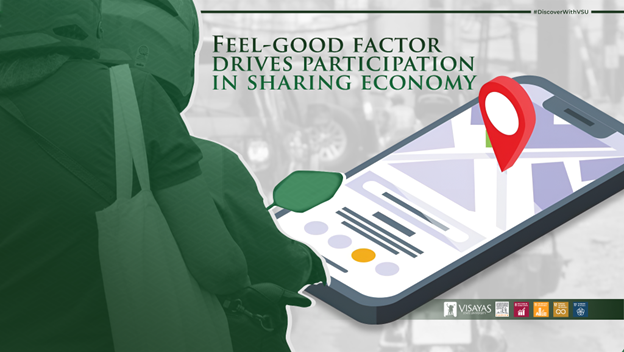#DiscoverWithVSU: Feel-good factor drives participation in sharing economy

This is the heart of a groundbreaking paper led by Dr. Mark Ratilla of the Visayas State University (VSU), now published in the prestigious Technology in Society journal by Elsevier.
Conducted with international researchers from France, Thailand, and Czech Republic, the study explores what truly moves individuals to supply their personal assets on sharing economy platforms that allow everyday people to temporarily rent or lend their resources, such as vehicles and accommodations.
The findings challenge traditional assumptions. While income and trust in the platform remain important, it turns out that a specific emotional driver known as “warm glow”, a pleasant sense of self-satisfaction from helping others, also pushes people to offer their possessions for public use.
More than 360 Filipino respondents aged 18-44 participated in the research. They were asked to imagine themselves sharing a motorcycle through a digital platform and respond to various psychological and emotional factors influencing their behavior.
The study used rigorous statistical modeling to analyze the results. The “warm glow” emotion stood out. People who anticipated feeling joy, pride, or personal fulfillment from sharing were more likely to express interest in doing so. That emotional pull even helped lessen the stress of decision-making, especially for those who already trusted the platform and its users.
Perhaps most surprising, environmental benefits, which are frequently touted by sharing economy platforms, did not significantly influence the participants' attitudes or intentions. Instead, social benefits, such as meeting others or feeling part of a community, were far more powerful.
Dr. Ratilla explains that many individuals today are motivated by more than just earning extra income.
“They want to feel that they are doing something good, not just for themselves, but for someone else. That feeling becomes the reward,” he said.
The study also sheds light on the unique behavior of Filipino users, especially millennials and Gen Z, who dominate the local sharing economy.
In the Philippines, services like Grab, Airbnb, and Foodpanda are deeply woven into daily life. Yet, the research shows that emotional drivers, not just practical needs, can shape how these platforms grow.
This research opens up new ways to design better digital experiences by surfacing the role of human emotion in tech-based services. Instead of focusing solely on prices or convenience, platform designers may consider how to make participation feel meaningful.
Additionally, this research is particularly relevant at a time when trust in digital transactions continues to evolve. The more people feel emotionally rewarded, the more confident they become in sharing what they have.
Published in March 2025 by Technology in Society, this paper contributes to a growing field of behavioral science in technology.
But at its core, it tells a simple story that people like to help, and they like how it makes them feel. That feeling might just be the missing piece in understanding how the sharing economy continues to thrive.
This article is aligned with Sustainable Development Goal (SDGs) 8: Decent Work and Economic Growth; SDG 11: Sustainable Cities and Communities; SDG 12: Responsible Consumption and Production, and; SDG 17: Partnerships for the Goals.

